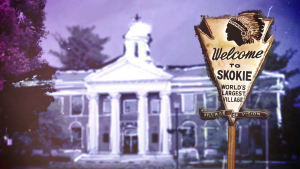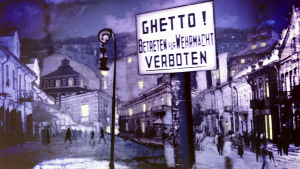About the Film
![]()
 Sixteen miles north of Chicago is the town of Skokie, Illinois. In the middle of the 20th Century, Skokie became a locus for Jewish Chicagoans looking for a life outside the crowded city. Among them were survivors of the Holocausts. By the 1970s, as many as one in ten of Skokie’s residents had either survived the Holocaust or were descended from someone who did. To the survivors, Skokie offered a chance at a peaceful, safe life. To others, this made Skokie a target.
Sixteen miles north of Chicago is the town of Skokie, Illinois. In the middle of the 20th Century, Skokie became a locus for Jewish Chicagoans looking for a life outside the crowded city. Among them were survivors of the Holocausts. By the 1970s, as many as one in ten of Skokie’s residents had either survived the Holocaust or were descended from someone who did. To the survivors, Skokie offered a chance at a peaceful, safe life. To others, this made Skokie a target.
In October of 1976, a neo-Nazi named Frank Collin sent a letter to the Village of Skokie requesting permission to hold a demonstration. After residents of the town objected, Skokie officials turned down Collin’s request. So Collin went to the American Civil Liberties Union, claiming that the town was violating his First Amendment rights… and the ACLU agreed. Collin and the ACLU sued Skokie, kicking off a court battle that would go to the heart of one of one of our most fundamental rights: Freedom of Assembly.
 Freedom of Assembly doesn’t get as much attention as other First Amendment rights like Freedom of Speech, Press and Religion, but Freedom of Assembly is just as central to our rights as Americans. Rather than be one voice exercising his or her Freedom of Speech, Freedom of Assembly allows us to gather in large groups and let our collective voices be a check on the government and other institutions. “It magnifies our voices,” says former ACLU President Nadine Strossen, “and makes it more likely that we’re going to have an impact.”
Freedom of Assembly doesn’t get as much attention as other First Amendment rights like Freedom of Speech, Press and Religion, but Freedom of Assembly is just as central to our rights as Americans. Rather than be one voice exercising his or her Freedom of Speech, Freedom of Assembly allows us to gather in large groups and let our collective voices be a check on the government and other institutions. “It magnifies our voices,” says former ACLU President Nadine Strossen, “and makes it more likely that we’re going to have an impact.”
And because Assembly is such a fundamental right, that means that it must be protected – even when it’s being exercised by people the vast majority of us find reprehensible. People like Frank Collin.
Further Reading
Read the text of National Socialist Party v. Skokie
Learn more about the history of the Holocaust
Credits
Directors, Gregory Blanc and Robe Imbriano
Writers, Gregory Blanc and Robe Imbriano
Narrator, Robe Imbriano
Producers, Gregory Blanc and Marc Tidalgo
Editor, Marc Tidalgo
Animation, Thomas Curtis and Rob Donnelly
Photography, Edward Marritz and Marc Menet
Senior Production Associate, Melissa Saucedo and Leila Wikel
Sound, Mark Mandler and Richard Pooler
Music, Audio Network
Online Editor, Evan Anthony
Re-recording Mixer, Neil Cedar, Sync Sound, Inc.
Head of Production, Jonna McLaughlin
Production & Post Coordinator, Dana Germano
Production Accountants, Mara Connolly, Andrea Yellen and Selen Esendal
Assistant to the Executive Producer, Willa Jones
Intern, Elza Bouhassira
Senior Producers, Wendy Roth and Kayce Jennings
Executive Producer, Tom Yellin


